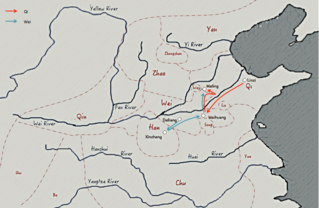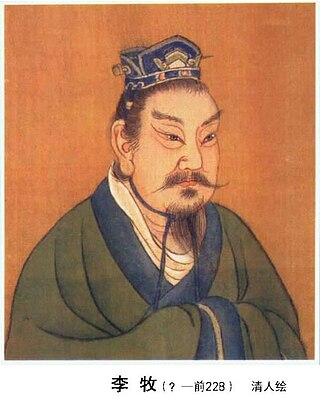
The Warring States period in Chinese history comprises the final centuries of the Zhou dynasty, which were characterized by warfare, bureaucratic and military reform, and political consolidation. It followed the Spring and Autumn period and concluded with the wars of conquest that saw the state of Qin annex each of the other contender states by 221 BC and found the Qin dynasty, the first imperial dynastic state in East Asian history.

Wei was one of the seven major states during the Warring States period of ancient China. It was created from the three-way Partition of Jin, together with Han and Zhao. Its territory lay between the states of Qin and Qi and included parts of modern-day Henan, Hebei, Shanxi, and Shandong. After its capital was moved from Anyi to Daliang during the reign of King Hui, Wei was also called Liang.

Qin was an ancient Chinese state during the Zhou dynasty. It is traditionally dated to 897 BC. The Qin state originated from a reconquest of western lands that had previously been lost to the Xirong. Its location at the western edge of Chinese civilisation allowed for expansion and development that was not available to its rivals in the North China Plain.

The Chu–Han Contention (楚漢相爭), also known as the Chu–Han War (楚漢戰爭), was an interregnum period in Imperial China between the fall of the Qin dynasty and the establishment of the Western Han dynasty. After the third and last Qin ruler, Ziying, unconditionally surrendered to rebel forces in 206 BCE, the former Qin Empire was divided by rebel leader Xiang Yu into the Eighteen Kingdoms, which were ruled by various rebel leaders and surrendered Qin generals. A civil war soon broke out, most prominently between two major contending powers – Xiang Yu's Western Chu and Liu Bang's Han. Some of the other kingdoms also waged war among themselves but these were largely insignificant compared to the main conflict between Chu and Han. The war ended in 202 BCE with a Han victory at the Battle of Gaixia, during which Xiang Yu committed suicide after making a last stand. Liu Bang subsequently proclaimed himself emperor and established the Western Han dynasty.

The Battle of Guìlíng was fought between the states of Qí and Wei in the Warring States period of Chinese history.

The Battle of Maling took place in Maling, currently Dazhangjia Town (大張家鎮), Shen County (莘县), Henan Province, in 342 BC during the Warring States period. The combatants were the State of Qi, who fought on behalf of the State of Han, and the State of Wei. This battle is well recorded in history texts and is famous for the tactics of Sun Bin, known as the "Tactic of Missing Stoves", in which one side is led to underestimate the other by creating an illusion of soldiers running away from the enemy army.

Sun Bin was a Chinese general, military strategist, and writer who lived during the Warring States period of Chinese history. A supposed descendant of Sun Tzu, Sun was tutored in military strategy by the hermit Guiguzi. He was accused of treason by Pang Juan while serving in the Wei state and was sentenced to face-tattooing and had his kneecaps removed, permanently crippling him. Sun later escaped from Wei and rose to prominence in the Qi state, serving as a military strategist and commander. He led Qi to victory against the Wei state at the Battle of Guiling and the Battle of Maling, killing Pang Juan in the battle and avenged himself in the process. Sun authored the military treatise Sun Bin's Art of War, which was rediscovered in a 1972 archaeological excavation after being lost for almost 2000 years.

Wei, known in historiography as Zhai Wei, was a dynastic state of China ruled by the Dingling people that existed from 388 to 392, during the Sixteen Kingdoms period of Chinese history. Its founder Zhai Liao had previously been vacillating between being a vassal of the Later Yan, Western Yan, and Eastern Jin dynasties, and in 388, after his last overture to reconcile with Later Yan's emperor Murong Chui was rejected, he founded his own dynasty, over the territory of modern central and eastern Henan. In 392, Zhai Wei, then under Zhai Liao's son Zhai Zhao, was destroyed by Later Yan forces. Because of its relatively small size and short lifespan, Zhai Wei is not included by historians among the Sixteen Kingdoms.
The Battle of Mayi, also known as the Scheme of Mayi (馬邑之謀) or the Encirclement at Mayi (馬邑之圍), was an abortive ambush operation by the Han dynasty against the invading Xiongnu forces led by Junchen Chanyu, with minimal casualties from both sides. Although no fighting actually took place, it marked the end of de jure peace between the Han dynasty and Xiongnu, and led to the beginning of the subsequent Han-Xiongnu War. The failure of the operation also motivated the Han court to develop effective cavalry forces and the use of offensive expeditionary military policies.

King Zhaoxiang of Qin, also abbreviated as King Zhao of Qin (秦昭王), born Ying Ji (嬴稷), was the king of the Qin state from 306 BC to 251 BC. He was the son of King Huiwen and younger brother of King Wu.

Li Mu, personal name Zuo (繓), courtesy name Mu (牧), was a Chinese military General of the State of Zhao during the Warring States period. He is regarded by Chinese folklore as one of the four Greatest Generals of the Late Warring States period, along with Bai Qi, Wang Jian, and Lian Po. He is widely considered as one of the best defensive tacticians commanders of ancient warfare.

Sun Bin's Art of War is a renowned Chinese treatise on military strategy that dates back to the Warring States period, an era of political instability and warfare in ancient China. It is credited to Sun Bin, who was believed to be a descendant of the famous military strategist Sun Tzu. Sun Bin served as a military advisor in the Qi state during this period and is said to have authored this piece on military tactics.

Qin's wars of unification were a series of military campaigns launched in the late 3rd century BC by the state of Qin against the other six powers remaining in China — Han, Zhao, Yan, Wei, Chu and Qi. Between 247 and 221 BC, Qin had developed into one of the most powerful of China's Seven Warring States that coalesced in the wake of the Zhou dynasty's decline, by now retaining a weak and merely ceremonial position among the warring states. In 230 BC, King Ying Zheng of Qin began the sequence of campaigns that would bring the Warring States period to a close, setting out to conquer each remaining sovereign one by one. This was completed in 221 BC with the fall of Qi, leaving the former Zhou sphere unified under a more centralized Qin control. Ying Zheng declared himself the First Emperor, or Qin Shi Huang—becoming the first sovereign over a unified China under the imperial Qin dynasty.
King Wei of Qi, whose personal name was Tian Yinqi (田因齊), was the king of the northern Chinese state of Qi during the Warring States period, when Qi was one of the most powerful states in China. He reigned from 356 to 320 BC. or according to another source from 378 to 343 BC. He was the first ruler of Qi to style himself "king".
Marquess Cheng of Zhao, personal name Zhao Zhong, was a marquess of the Zhao state. He was the son of Marquess Jing, whom he succeeded.
Tian Ji, courtesy name Qi (齐), was a military general of the Qi state during the early Warring States period of Chinese history. Tian Ji met Sun Bin and recommended him to King Wei of Qi as a military strategist. Tian Ji commanded the Qi armies in the Battle of Guiling and Battle of Maling, scoring victories against the Wei state with help and guidance from Sun Bin.

King Kang of Chu was from 559 to 545 BC the king of Chu, a major power during the Spring and Autumn period of ancient China. Born Xiong Zhao, he succeeded his father King Gong of Chu. His reign was marked by constant wars with Jin, Chu's traditional enemy, and Wu, its new enemy. He ruled for 15 years and was succeeded by his son, Jia'ao, who would four years later be murdered by King Kang's younger brother King Ling of Chu.

The military of the Warring States refers primarily to the military apparatuses of the Seven Warring States which fought from around 475 BC to 221 BC when the state of Qin conquered the other six states, forming China's first imperial dynasty, the Qin dynasty.
Crown Prince Shen was a crown prince of the State of Wei during the Warring States period of ancient China. He was also called Wei Shen (魏申).














